Key Highlights
- Selling stickers on Amazon in 2025 offers a low-cost, high-margin business opportunity with strong potential for creativity and growth.
- Print-on-demand keeps startup costs low, allowing sellers to test designs and minimize financial risk.
- Choosing a niche, studying trends, and designing for specific audiences builds brand identity and drives consistent sales.
- Selecting the right sticker types and cut styles ensures your products match customer needs and use cases.
- Optimized listings with strong keywords, clear features, and quality images boost visibility and conversions.
- FBA ensures fast delivery and Prime access, while FBM offers control over packaging and inventory.
- Marketing through Amazon ads, social media, and A+ Content enhances reach, trust, and repeat purchases.
- Tracking sales data and refining listings through updates and pricing tweaks ensures long-term business growth.
Ever wondered how some people turn simple sticker designs into a thriving online business? If you’re curious about starting your own sticker brand or side hustle, you’re in the right place. In this blog, we’ll show you how to sell stickers on Amazon in 2025, from designing custom stickers and vinyl stickers to creating sticker packs and single sticker sheets. You’ll discover how to manage upfront costs, optimize listings with keyword research and detailed descriptions, reach your target audience, and use social media marketing to boost sales. Let’s turn your new sticker designs into a profitable, high-margin sticker business today.
How to Sell Stickers on Amazon: A Step-by-Step Guide

Turning your sticker designs into a profitable Amazon business requires strategy, careful planning, and attention to detail. Before diving in, follow this step-by-step guide, from setting up your seller account to designing, listing, and marketing your stickers efficiently.
Step 1: Set Up an Amazon Seller Account
The first step to selling stickers on Amazon is creating a seller account. When registering, you can choose between two plans:
- Individual Seller Plan: No monthly fee, but a small fee is charged per sale.
- Professional Seller Plan: Monthly subscription fee, but comes with additional tools, reporting options, and features.
For a detailed, step-by-step guide on setting up your Amazon seller account, check out our blog on how to become an Amazon seller.
Step 2: Choosing the Right Niche and Designing Your Stickers
Finding the right niche and creating designs that appeal to your target audience is crucial for a successful sticker business. Here’s how to approach it:
- Identify Your Target Audience: Think about who would buy your stickers: students, planners, businesses, or hobbyists.
- Focus on a Specific Theme: Stickers that follow a clear theme, like motivational quotes, cute illustrations, or pop culture, often perform better.
- Analyze Amazon Trends: Look at bestsellers and trending designs on Amazon to spot opportunities for unique or in-demand stickers.
- Start Simple: Begin with a few designs to test the market before expanding your collection.
- Refine Your Design Process: Once you know what works, iterate and create multiple sticker variations to cater to your audience.
While choosing the niche is the priority, design tools like Canva, Adobe Illustrator, or free online platforms can help you bring your sticker ideas to life efficiently.
Step 3: Picking the Right Product
Once you’ve chosen your niche, the next step is selecting the types of stickers you want to sell. Your product choice can impact profit margins, customer appeal, and repeat sales. Here’s what to consider:
1. Sticker Type
Here’s a table summarizing the main sticker types and their uses:
|
Sticker Type |
Description |
|
Paper Stickers |
Basic stickers printed on paper material. |
|
Holographic Stickers |
Stickers with a shiny, reflective finish. |
|
Vinyl Stickers |
Durable, waterproof stickers made from vinyl. |
|
Transparent Stickers |
Clear stickers that blend with the surface they’re applied to. |
2. Cut Type
To help you decide which cut type suits your product, here's a comparison table:
|
Cut Type |
Description |
|
Die-cut |
Custom-shaped stickers that follow the outline of your design. |
|
Kiss-cut |
Stickers cut through the top layer of vinyl, leaving the backing intact. |
|
Sticker sheets |
Multiple designs on one sheet. |
|
Bumper stickers |
Durable, weather-resistant stickers designed for outdoor use. |
|
Roll stickers |
Stickers on rolls, ideal for bulk labeling or promotional materials. |
Choosing the right combination of sticker type and cut ensures your products are appealing, easy to use, and aligned with your target audience’s preferences.
Step 4: Sourcing Stickers (Print-on-Demand vs Bulk Manufacturing)
Now that you know what stickers you want to sell, the next step is deciding how to produce them. There are two main options:
- Print-on-Demand (POD)
- Bulk Manufacturing.
Each method has its pros and cons. Here's what you need to know:
|
Method |
Pros |
Cons |
|
Print-on-Demand |
- Minimal upfront investment, pay per order |
- Higher per-unit cost, lower profit margins |
|
Bulk Manufacturing |
- Lower production cost per sticker, higher profit margins |
- Higher upfront investment for materials and equipment |
Step 5: Listing Your Stickers on Amazon
Creating a standout Amazon listing is just as important as designing your stickers. A well-crafted listing helps your products get discovered, highlights their unique features, and convinces shoppers to click “Buy Now.” Here’s how to make your stickers irresistible:
- Craft an Effective Product Title: Use keyword optimization to include terms your target audience is searching for, such as “custom stickers,” “vinyl stickers,” or “sticker packs.” Keep it clear, descriptive, and easy to read.
- Write an Engaging Product Description: Focus on benefits and use cases. Explain how your stickers can be used for planners, scrapbooks, laptops, or gift labels, and why they stand out.
- Create Bullet Points Highlighting Key Features: Highlight key sticker features clearly, including durability, waterproof quality, size, and design appeal, so buyers quickly understand why your stickers stand out and are worth purchasing.
- Choose the Right Product Category and Search Terms: Select the most relevant Amazon category and use backend search terms to improve discoverability. Include variations and synonyms to reach a wider audience.
- Upload High-Quality Images: Use multiple images showing your stickers in real-life use, close-ups of designs, and different angles. Lifestyle images help buyers visualize your product.
- Set the Right Price: Balance production costs, profit margins, and competitor pricing. Consider offering sticker packs or virtual bundles to increase value for buyers.
Step 6: Shipping and Fulfillment
Choosing between the two fulfillment options, FBA and FBM, depends on your goals and resources.
- FBA (Fulfillment by Amazon) is ideal if you want Amazon to handle storage, packing, and shipping, ensuring faster delivery and access to Prime customers.
- FBM (Fulfillment by Merchant) works best if you prefer complete control over packaging, want to save on FBA fees, or are testing new designs with low inventory.
Still confused? Explore our in-depth guide comparing Amazon FBA vs. FBM to understand which fulfillment option fits your sticker business best.
Once you’ve chosen between FBA and FBM, focus on shipping efficiently and keeping your inventory under control:
- Durability: Use rigid mailers, bubble envelopes, or cardboard backing to protect stickers during shipping.
- Presentation: Package stickers neatly, consider branded inserts or attractive arrangements to enhance unboxing.
- Inventory Management: Track sales regularly to prevent stockouts or overstocking, adjusting quantities as needed.
Step 7: Marketing and Promotion
Even the best-designed stickers won’t sell without visibility. Here are some effective ways to market and promote your sticker business on Amazon:
- Amazon Advertising: Use Sponsored Products to increase visibility and drive more traffic to your listings.
- Social Media: Share designs on Instagram and Pinterest to attract sticker lovers and grow an audience outside Amazon.
- Customer Engagement: Encourage reviews and feedback to build credibility and boost organic rankings.
- Promotions: Offer discounts or coupon codes to attract new buyers and encourage repeat purchases.
- Early Reviews: Use ethical methods to gather initial reviews that build trust and social proof.
- Amazon A+ Content: Enhance your listing visuals with rich content, comparison charts, and brand storytelling.
Step 8: Handling Customer Service & Returns
Strong customer service can set your sticker brand apart and build long-term loyalty. Always respond promptly and politely to customer questions, whether they’re about shipping, product details, or bulk orders. Clear and friendly communication builds trust and encourages repeat purchases.
When negative reviews appear, don’t ignore them. Instead, acknowledge the concern, address the issue professionally, and offer solutions when possible. This shows future buyers that you care about quality and customer satisfaction.
Finally, be clear about your return policy. Since stickers are low-cost items and often cannot be resold once opened, outline whether you’ll accept returns or offer replacements. A fair, transparent policy helps manage customer expectations and prevents confusion.
How Much Does It Cost to Start a Sticker Business?

The startup costs for selling stickers on Amazon vary depending on your production method. While stickers themselves are inexpensive, equipment for in-house printing can add up quickly. Here’s a breakdown:
- Inkjet printer: $100–$300
- Cutting machine: $150–$400
- Specialty sticker paper: $20–$50 per pack
- Print-on-demand (POD) services: Production costs per sticker typically range from $0.25–$1
- Optional platform or subscription fees: $0–$30/month
- Professional Amazon selling plan: ($39.99/month
- Marketing and social media promotion (optional): Varies based on scale
These expenses can total anywhere from $300–$750 or more. However, using POD remains the most cost-effective option for beginners—it keeps upfront investments low while allowing flexibility to test new sticker designs and scale profitably.
Note: All prices are approximate and may vary depending on suppliers and tools used.
For further queries, check out our complete blog on how much does it cost to sell on Amazon.
What Makes Stickers a Profitable Product to Sell on Amazon?

Stickers aren’t just fun; they’re a smart product to sell on Amazon, offering low startup costs, high profit margins, and plenty of creative freedom. Here’s why they make an ideal choice for small businesses and side hustles:
1. High Demand with Low Competition
From custom to holographic and bumper stickers, shoppers love variety. With smart keyword research, your listings can stand out in a profitable niche.
2. Low Production & Shipping Costs
With simple tools like a printer, cutter, and sticker paper, you can create quality products affordably, keeping margins as high as 50–70%.
3. Creative Freedom & Niche Targeting
Design themed or custom sticker packs that match your audience’s interests, helping you build a strong, recognizable brand.
4. Access to a Massive Customer Base
Amazon connects you to millions of potential buyers. Combine it with social media and affiliate marketing to boost visibility cost-effectively.
Struggling to drive extra traffic without a website? Learn how to use affiliate links effectively by following our guide on signing up for the Amazon Affiliate Program without a website.
5. Easy Scalability with Print-on-Demand
POD services help you launch new designs and expand quickly without inventory or fulfillment hassles, ideal for testing and growing sustainably.
With consistent listing optimization, smart promotion, and niche targeting, small sticker sellers can earn $500–$2,000 per month, with significant growth potential as you expand your product range.
How Can You Monitor Sales Performance and Optimize Your Sticker Business on Amazon?

Tracking your sales and customer behavior is key to scaling your sticker business on Amazon. Use Seller Central analytics to monitor units sold, conversion rates, and impressions, while reviewing customer feedback to refine products. Regularly test titles, images, and pricing to see what drives results, and use these insights to optimize your listings for better visibility and consistent sales growth.
However, if you notice sales slowing down, try tweaking your listing to improve visibility and conversions:
- Update Product Titles: Add relevant keywords like “vinyl stickers” or “sticker packs” to match customer searches.
- Refresh Images: Show stickers in real-life settings, on laptops, water bottles, or planners, to help buyers visualize usage.
- Improve Descriptions: Highlight benefits such as waterproof quality, durability, or easy peel-and-stick application.
- Adjust Pricing: Test different price points or bundle offers to increase perceived value.
For a deeper dive into monitoring and optimizing Amazon listings, check out our guide on mastering Amazon seller metrics.
What are Some Common Mistakes to Avoid When Selling Stickers on Amazon?

A sticker business on Amazon can be rewarding, but many beginners stumble over avoidable mistakes that hurt sales and profit margins. Knowing these pitfalls can save you time, money, and frustration. Here are the most common mistakes to watch out for:
1. Overpricing
Setting prices too high can scare away potential buyers, while pricing too low can eat into your profits. Find a balance by considering production costs, shipping labels, and market trends.
2. Ignoring Keyword Optimization
Without keyword research and proper Amazon search engine optimization, your stickers may never reach your target audience. Use relevant terms like custom stickers, sticker packs, and vinyl stickers to appear in searches.
3. Poor Product Images
Blurry or low-quality photos make even the best sticker designs unappealing. Show your products clearly, including sticker sheets, holographic stickers, and close-ups of bumper stickers or roll stickers.
4. Not Responding to Customer Queries
Slow or no response to questions can hurt your online store’s reputation. Promptly answer inquiries to build trust and encourage repeat buyers.
5. Not Using Tracking for Self-Fulfilled Orders
If you handle shipping yourself, failing to provide tracking can lead to lost packages, complaints, and negative reviews. Always include tracking for free shipping or self-fulfilled orders to maintain credibility.
Turn Stickers Into a Scalable Amazon Business with beBOLD Digital
Selling stickers on Amazon in 2025 is more than just a fun, creative outlet; it’s a business model with real profit potential when done strategically. From designing niche sticker packs to optimizing Amazon listings and leveraging print-on-demand, you have all the tools to build a scalable brand. But success on Amazon doesn’t happen by chance; it requires smart keyword targeting, compelling content, and data-driven optimization. That’s where beBOLD Digital comes in. As a full-service Amazon agency, we help sellers like you maximize visibility, increase conversions, and turn side hustles into thriving businesses.
Ready to grow your sticker business on Amazon? Partner with beBOLD Digital today and start scaling with confidence.
Frequently Asked Questions
Is selling stickers profitable, and what is the best place to sell stickers?
Yes, stickers can be highly profitable due to low production costs and high demand. Amazon is a top platform, offering access to millions of buyers, but you can also sell on Etsy, your own website, or other ecommerce platforms.
How to sell stickers on Amazon KDP?
Amazon KDP allows you to publish sticker books. Design your sticker sheets or custom designs, format them as a book or journal, upload via KDP, optimize keywords, and market your book. Each sale generates royalties with minimal inventory management.
What is the best way to ship stickers when selling them through Amazon FBA?
Ship stickers in protective packaging to prevent bending. Use sticker sheets or sticker packs with bubble mailers or rigid envelopes. Amazon FBA handles fulfillment, so label correctly, include tracking if self-fulfilled, and consider free shipping to boost sales.
Are there specific Amazon fees or costs to consider when selling stickers?
Yes. Amazon charges a referral fee (usually 15% per item), an optional professional selling plan ($39.99/month), and FBA fees if using fulfillment services. Factor in production costs, shipping materials, and marketing expenses for accurate profit calculations.
What are the most popular sticker types or designs on Amazon right now?
Popular stickers include holographic stickers, bumper stickers, vinyl stickers, sticker packs, and custom designs. Trendy themes often follow pop culture, cute illustrations, planner stickers, or motivational quotes, with single-themed sticker sets performing well.
What supplies are needed to start a sticker business?
Essential supplies include an inkjet or laser printer, a cutting machine, sticker paper, vinyl layers for specialty stickers, protective packaging like bubble mailers, design tools or software, and, optionally, shipping labels for self-fulfilled orders.
Do I need any special licenses or approvals to sell stickers on Amazon?
Generally, selling stickers requires no special licenses. However, ensure designs don’t infringe copyrights or trademarks. Certain promotional or custom products may require approvals, but standard stickers can be sold under Amazon’s seller account with adherence to their policies.
Want to take your sticker business from side hustle to scalable brand? Book a call with beBOLD Digital today and unlock proven Amazon strategies to grow sales and profits.


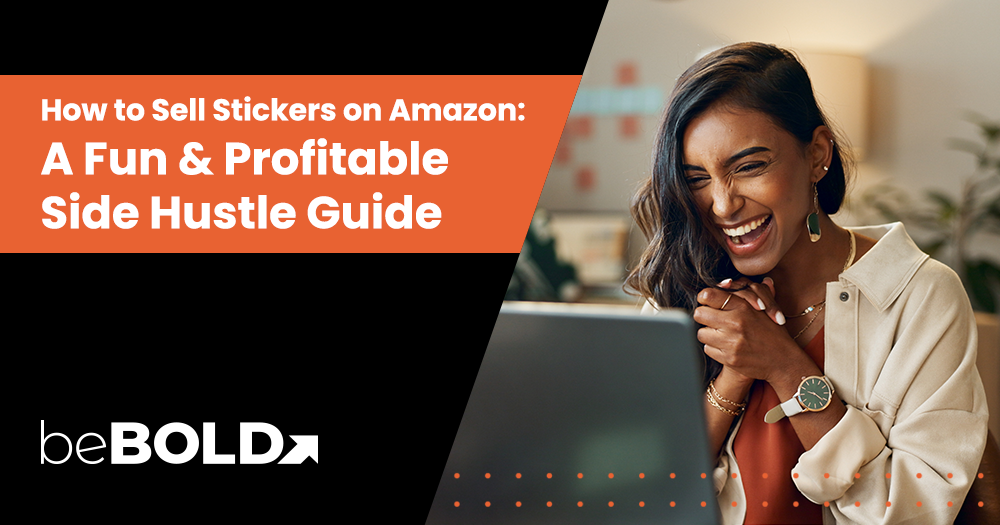

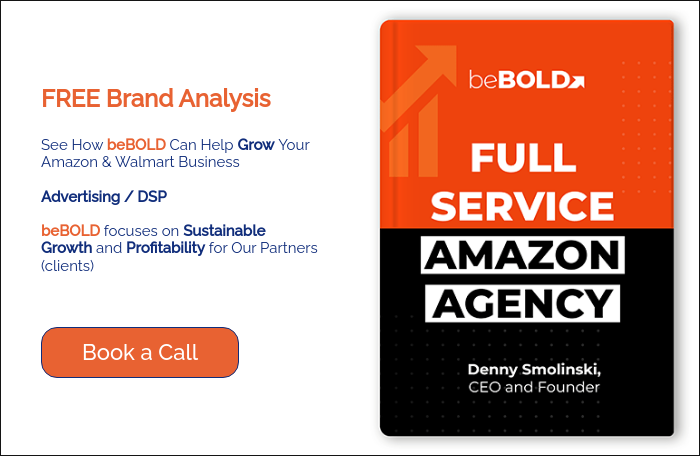


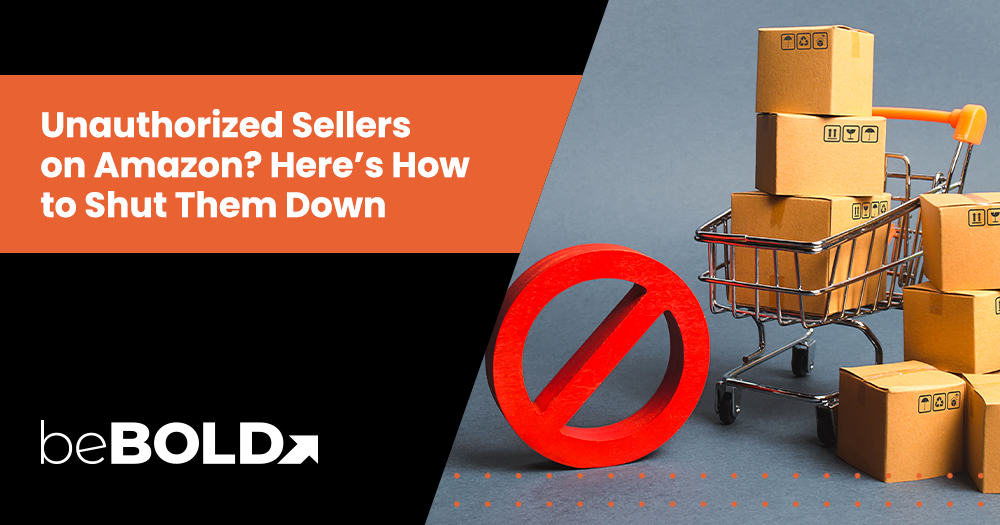
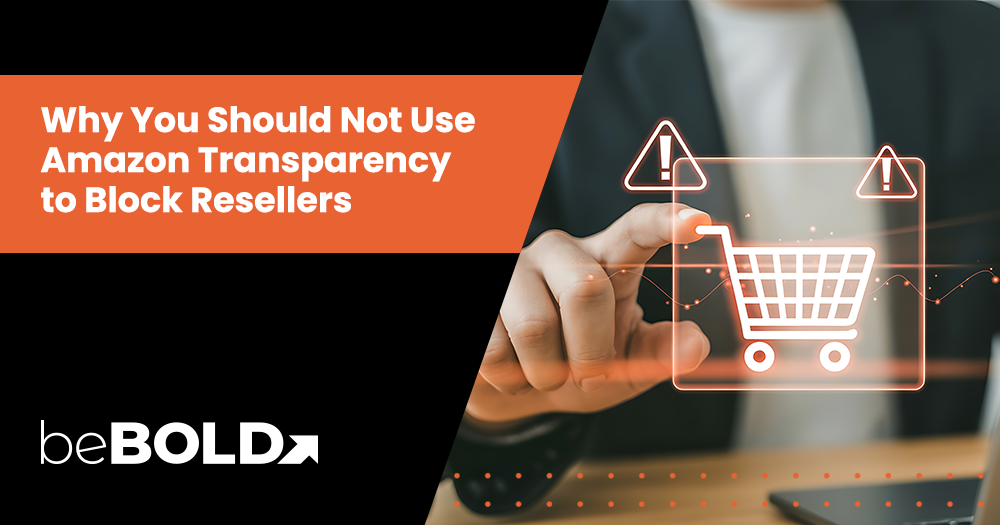
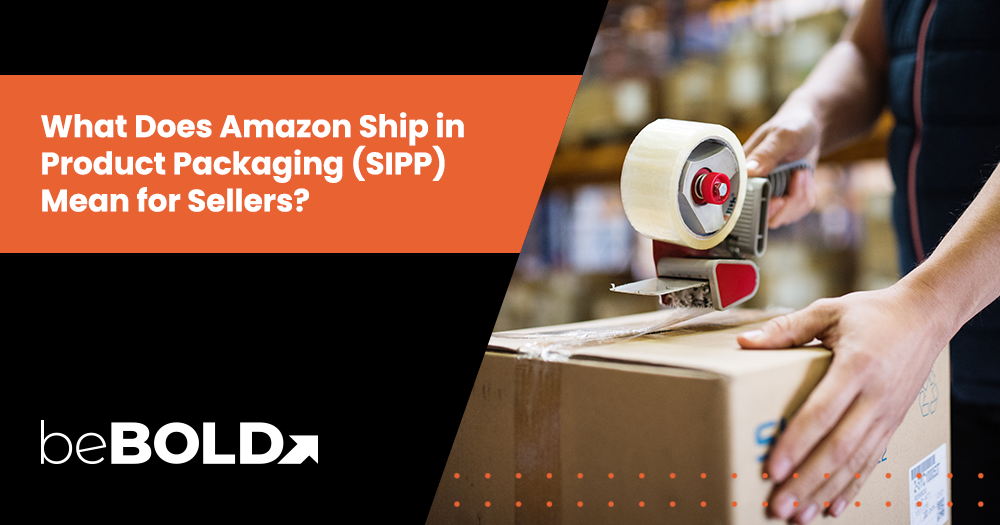
Comments